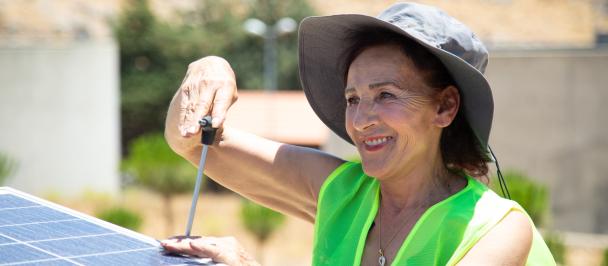CSW65 virtual ministerial round table “Creating an enabling environment for women’s full and effective participation and decision-making in public life”
CSW65 Virtual Ministerial Roundtable
March 15, 2021
As prepared for delivery.
Opening
Under-Secretary-General and Executive Director of UN Women, Phumzile Mlambo-Ngcuka,
Excellencies,
Ladies and Gentlemen,
Dear Colleagues and Friends,
We have heard how women are still vastly underrepresented in all facets of decision-making -- in part because of structural barriers and discriminatory social norms.
It is a world where nine out of 10 people are still biased against women.
Now, as some countries start to slowly recover from this devastating pandemic, women must have the opportunity to play a full role in shaping the pivotal decisions currently being made.
These are choices that will affect the wellbeing of people and the planet for generations to come.
To do this, we must create an “enabling environment”.
And today, I would like to outline four key areas that can help us to achieve our aims.
1. Systems Transformation
Firstly, as we start to shape the post- COVID-19 world, we need to think about an entire systems transformation.
That means transforming institutions and systems to set the conditions for women to play a full role in public life.
It involves working to simultaneously strengthen constitutional, legislative, and political processes -- including through the introduction of “temporary special measures” such as quotas.
We know that gender quotas work when they are well designed and effectively implemented.
Look, for instance, to the 84 UN Member States that have adopted legislated quotas. In those countries, women are on average elected to 26% of seats in parliament, compared with 21% in countries without such legislation.
Temporary special measures are a key element of the UN Secretary-General’s Call to Action for Human Rights, aimed at strengthening system-wide application and promotion of women’s leadership across all sectors.
2. Finance
Secondly, there is a finance gap when it comes to promoting gender equality and women’s equal participation.
To address this gulf -- we must improve access to funding to support women’s participation in public life and civil society organisations.
We must also support the design and implementation of national gender budgets to help public administrations implement their commitments to gender equality.
3. Challenging and Reforming Workplace Culture
Thirdly, we must challenge and reform workplace cultures to enable women to harness their full leadership potential.
This includes both penalising and eliminating sexism, violence, and harassment -- and promoting a gender-inclusive senior management culture.
We must also advance an improved work-life balance for both women and men -- including through flexible work arrangements and parental leave.
And we must raise awareness. That includes working with religious and community leaders as well as “male champions” of gender equality to tackle harmful, deeply ingrained social norms.
4. Need for Better Data to Inform Responses
Finally, we need more and better sex-disaggregated data so we can pinpoint where gender inequalities remain.
That will also help us to demonstrate -- with evidence -- how women’s equal participation makes a difference for all.
UNDP is working with the University of Pittsburgh to monitor the state of gender equality in the public sector through our Gender Equality in Public Administration (GEPA) initiative. A new report, using data from 171 countries, will be launched in the coming months.
And later this year, UNDP will launch a new Gender Equality Seal Award for Public Institutions -- a global recognition of institutions that advance gender equality and women's empowerment in their policies and programmes, and their workplace.
UNDP also keenly recognises that we need to advance the conversation on how to contribute to the economic security and independence that is necessary for women to engage more deeply in the decisions that will change their future.
Our new policy brief launched earlier this month explores how a Temporary Basic Income specifically for women in developing countries could help us to make progress in this area. Using new data, it puts forward the case that a worthwhile monthly investment of 0.07% of developing countries’ GDP could help 613 million working-aged women living in poverty to absorb the shock of the pandemic.
And the COVID-19 Global Gender Response Tracker by UNDP and UN Women is helping Governments to analyse national measures that directly address women’s economic and social security -- including unpaid care work, for instance.
Such resources will play a part in paving the way for the structural transformation needed to amplify women’s voices.
UNDP’s Wider Work/Added Value
Across the globe, UNDP is working to promote women’s equal participation and leadership in all forms of decision-making -- including in public institutions, parliaments, the judiciary, CSOs and the private sector.
Thanks to UNDP’s support, some 180 measures -- from electoral quotas to gender-smart business policies -- were put in place by countries across the world in 2019.
Closing
Excellencies,
Ladies and Gentlemen,
To “build forward better” from the COVID-19 crisis, and to get the Global Goals firmly back on track, we cannot simply return to the world we had before.
We must do things differently.
And we must move much faster.
That means shattering the barriers that hold women and girls back and “disrupting” the status quo.
As we kick-off CSW65 today, I am inspired by the new and often pioneering measures taken by Member States to boost the participation of women in decision-making and leadership spaces.
The United Nations Development Programme and the UN system will continue to partner with you in this critical work -- ultimately towards a more equal, more inclusive, and more sustainable future.
Thank you.

 Locations
Locations




